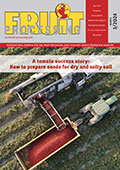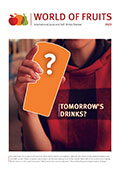Expert flavorists will enhance sweet and culinary capabilities with cutting-edge modulation technologies
IFF a global leader in solutions for food and beverages, health, biosciences, and scent has increased its innovation capabilities with two new state-of-the-art flavour labs at its facility in Northern Europe. The sweet and culinary flavour creation labs are the latest addition to the company’s expansive campus that has been in operation since 1964, spanning more than 312,150 square feet in Brabrand, Denmark.
The innovation hub is home to more than 400 employees engaged in research, application development, ingredient and flavour creation. The expanded facility will enable local and regional manufacturers to work in close partnership with a new team of flavourists who will introduce the latest modulation technologies and develop solutions for the beverage, bakery, dairy, snacks, culinary, bars and confectionery end markets. Working with an extensive library of proprietary flavor ingredients they will create exciting and unique flavour experiences for consumers, especially in areas such as masking, sweetness and umami.
“This expanded facility is a testament to our continued investment in innovation to meet evolving consumer expectations,” said Jan Bechtel, regional president of Nourish Europe, IFF. “We will continue to build on our deep expertise and scientific knowledge and invest in tools and products to bring what matters most to consumers in the market: creating the next generation of delicious, healthy and experiential food and beverages.”
Expert flavourists will have access to IFF’s latest research innovations, particularly in plant-based and biotechnology, along with resources like pilot plant manufacturing, ingredient expertise and evaluation studios, creating the perfect environment for end-to-end product design.
“We’re thrilled to launch these flavour labs,” said Laurens Reiber, creative director, Nourish Europe, IFF. “Brabrand is already a massive innovation center, and its location helps us better understand local market preferences and deliver trending global flavours. Now we’re investing further to boost our speed-to-market capabilities and to bring greater value to our partners.”
Following the completion of the Culinary Design Center last summer in Denmark, the opening of the new flavour labs is the company’s latest investment in R&D to develop winning solutions that meet customer and market needs with speed, agility and creativity.
Sidel has opened a new hub dedicated to PET recycling. At its unique small-scale PET recycling pilot line in Octeville, France, Sidel will develop its understanding of PET recycling with the aim of giving comprehensive support to the market as it switches to greater use of recycled PET.
Seeking carbon neutrality, the packaging industry is in the middle of a transition period that aims to replace virgin PET with recycled PET. Sidel is engaging with this transition to circular packaging solutions, enabling r-PET to be more widely used. The unique small-scale PET recycling line will allow Sidel to develop advanced knowledge about the recycling of food-contact PET bottles. As Sidel packaging experts assess the impact of additives and primary packaging materials on r-PET resin the facility will become an important reference for raw material producers, recyclers and recycling regulatory organisations. The line will also enable Sidel to further develop its own knowledge, ideas and innovative packaging solutions.
Helping to meet demand for r-PET
Demand for r-PET is increasing and the market is developing as brand owners seek carbon neutral solutions. The amount of recycled PET in packaging globally has increased to 8 % compared to 5 % in 2018. In Europe, the average is already 15 % and is projected to grow to 35 % in 2030.1
“There is a big move towards recycled PET, but demand is outstripping supply,” says Naima Boutroy, Sidel’s Global Packaging Expert. “The market still has a lot to learn and we can provide valuable insights. There is a variability in recycled PET resin grades, and standardisation is still in development. We need to address this to create the best possible finished bottles. Our line will test the recyclability of post-consumer PET bottles from different feed stocks, including additives and caps as well as labels, inks and glue. We will be working with traditional Sidel customers such as brand owners, converters and co-packers, as well as other suppliers like raw material producers, recyclers and regulatory organisations, to enable the scaling-up of r-PET capacity. We can also check any innovations comply with bottle-to-bottle recycling.”
Fully-equipped line to study entire process
Sidel’s new line will take raw material from industrial partners such as sorting facilities, recyclers and brand owners. It will then recreate and study all aspects of the process from bales to flakes including pellets ready to be injected into preform, injection and blow moulding.
Sidel will give the packaging industry the opportunity to access a fully equipped pilot line. This line covers every step of the recycling process: from washing, drying and pellet extrusion, to solid-state polymerisation, including dedicated process and laboratory controls at every step.
Making PET a more sustainable choice
PET is proven to be recyclable and is the only food-safe bottle-to-bottle recycled material, but the market has yet to see the production of standardised r-PET resin grade in high quantities; achieving this could facilitate the market conversion from virgin PET to r-PET. Lifecycle analysis shows that PET already has the best carbon footprint among materials currently available; creating a robust recycling loop to achieve full circularity at scale will make PET an even more sustainable choice.
Sidel to become one-stop shop for r-PET
Sidel’s investment in the r-PET pilot line is unparalleled in the packaging industry and will also empower Sidel in shaping the packaging solutions of tomorrow. The line, which has a holistic bottle-to-bottle approach, is just one of a range of services that Sidel is establishing under the name RePETable™ services. The services will draw upon Sidel’s 40+ years of blowing and packaging expertise, to support brand owners and convertors in producing r-PET bottles through line upgrade solutions, packaging optimisation, blowing process qualification, troubleshooting, r-PET processing training.
Science and business join forces in Brazil to accelerate innovation in food by focusing on the sustainable use of LATAM’s biodiversity and affordable nutrition for consumers
Three leading global companies, Givaudan, Bühler, and Cargill, have formed a consortium in collaboration with the FoodTech HUB Latam and ITAL, Food Technology Institute, to build a food innovation centre in the city of Campinas, recognised as Brazil’s tech powerhouse. The “Tropical Food Innovation Lab” will be located at the Food Technology Institute, ITAL, in a fully refurbished, 1,300 square metre area.
This new hub will be the go-to place in Latin America to connect and develop sustainable, future food and beverage products. Start-ups, companies, investors, universities and research institutions will have direct access to high-end technologies for rapid prototyping and plugging into the global food tech ecosystem that will foster fast-paced innovation in the food and beverage sector.
The most current generation of wet and dry extrusion systems for plant-based proteins, as well as beverages processing units will add complementary capabilities to the existing facilities of ITAL. When complete, the facility will feature new application labs and a state of the art demo kitchen, where consumers, food scientists, nutritionists, chefs, mixologists and marketers, among other professionals, will work together to create sustainable new products.
In a world facing major challenges from climate change, combined with a population expected to exceed 9.5 billion people by 2050, it is essential for the food industry to take positive action and work towards a regenerative and equitable food system that and provides healthy, safe and nutritious food for all, while staying within the planetary boundaries.
Brazil has the richest plant biodiversity on the planet, distributed in six major biomes and is one of the world’s main food producers. Yet immense potential remains, with regards to healthy and sustainable products, novel food and food waste reduction, contributing to Food Systems Transformation.
The Tropical Food Innovation Lab is planned to open in Q1 2023.
Strengthened organization will focus on R&D project pipeline growth in ingredient and process development
DuPont Nutrition & Health announced it is expanding its R&D team by creating a “clean label hub” at the Brabrand facility. Intending to boost its project pipeline in healthy nutrition and clean label texturant offerings, six new employees will join the existing team to focus on both ingredient and process development.
The hub will feature experts with backgrounds in clean label and sustainability – two fields that often work together and serve related purposes. Working closely with existing project teams, the hub will bring products to market quickly and help grow the existing project pipeline.
“Clean label is about creating foods and beverages with ingredients that consumers recognize, feel good about putting into their bodies, and that respect the Earth and its resources,” said Gerard Lynch, R&D Leader, Systems & Texturants, Emulsifiers & Sweeteners. “Our ingredients are already used in many applications that consumers consider clean label, but there are tremendous opportunities to innovate – creating ingredients that are even more sustainable, using a larger part of the natural raw materials, while providing health benefits to consumers. Committing to this innovation is critical for our ongoing success and growth.”
With the ability to utilize the broadest capabilities in terms of natural raw materials access, processing, across fruits, vegetables, seaweeds and nutritional science, DuPont Nutrition & Health has huge potential to develop functional ingredients that meet consumer expectations.
The hub will help customers continue to navigate clean label trends in a proactive and sustainable way. DuPont Nutrition & Health is seeking creative scientists and engineers to identify ways to convert sustainable and natural raw materials into clean label solutions that meet consumer demands for simplicity and authenticity, all without compromising taste, texture and nutritional qualities.
Planned to be in place by early 2019, the clean label texturants team will have the opportunity to tackle exciting projects to provide texture and stability for multiple food applications.









